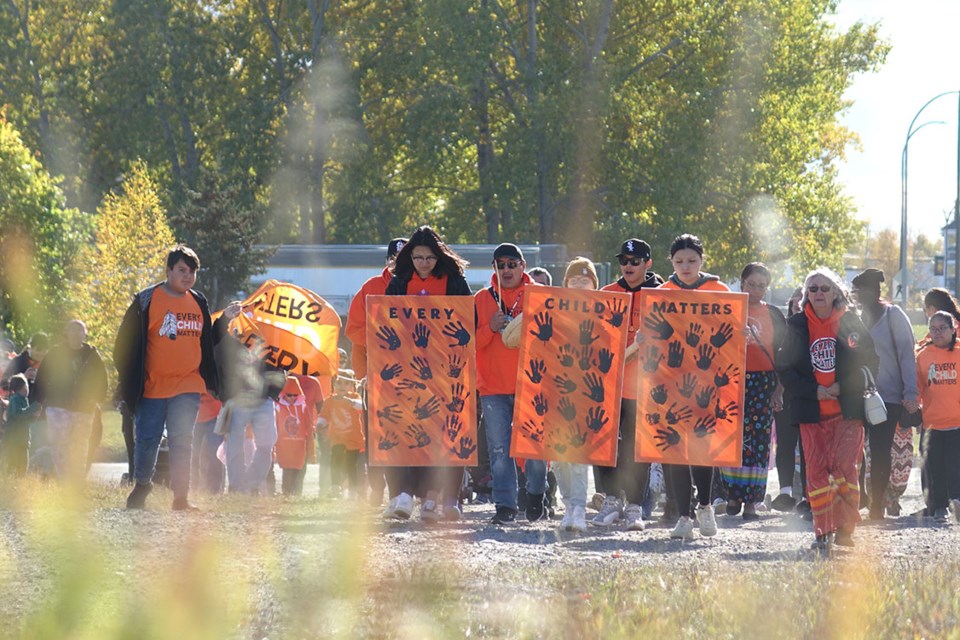National Day for Truth and Reconciliation events in Thompson on Sept. 30 focused not only on the wrongs of the past but the effects they have today and the changes needed to create a more equitable present and future for Indigenous Peoples in Canada.
Following a walk from the Royal Canadian Legion to the residential school monument near the Spirit Way float plane display, O-Pipon-Na-Piwin Cree Nation Chief Shirley Ducharme, vice-chief of Manitoba Keewatinowi Okimakanak, recalled memories from her childhood revolving around residential schools.
“I had friends that came home … close family that came home,” she said. “They never spoke about about how they were treated. They never spoke about their experiences. But we were so grateful that they were home for the summer with us.”
The emotions were reversed come fall.
“They were dragged into the planes,” she said. “They refused to go but there were people that forced them to. The parents … they couldn't do anything. They couldn't hang onto their children. And to see those young people, especially the little ones, kicking and screaming, they did not want to leave home.”
The trauma of those experiences resonates to this day, said elder Jack Robinson, who conducted a pipe ceremony at the monument.
“There’s a lot of pain out there,” he said of his work as a drug and alcohol counsellor.”They’re using alcohol and drugs as a painkiller.”
That message was echoed by Dr. Herman Michell, who was the keynote speaker at Keewatin Tribal Council’s 7th-annual Orange Shirt Day event at the Ma-Mow-We-Tak Friendship Centre. A former R.D.Parker Collegiate student and residential school survivor who has relatives in the city and among those living on Thompson’s streets, Michell said the effects of residential school and other colonial policies that have impacted Indigenous Peoples since the arrival of Europeans in North America are plain for everybody to see within the city’s homeless population.
“A lot of times people don’t understand why they are in the situation that they are in,” Michell told the Thompson Citizen. “Today is an awesome opportunity to really show what that story is all about, to really express the root causes of what’s going on in the city of Thompson, in every city across Canada.”
Despite the ongoing harms of Canada’s mistreatment of Indigenous Peoples, there are also hopeful signs, Michell said.
“I think it’s really important that in the schools today, and the universities today, that they teach the real history of this country,” he said.
Michell also believes that the events of the past few years represent a change in how Indigenous Peoples’ struggles are perceived.
“There’s a shift in thinking that’s happening across Canada right now,” he said, with the discovery of unmarked graves at former residential school sites acting as a catalyst for change.
“The unmarked graves sent shockwaves because it really brought to light that there were children involved and there shouldn’t be a graveyard in any schoolyard.”
Recognizing and learning from the mistakes and wrongs of the past is only one step, however, said longtime Missing and Murdered indigenous Women and Girls advocate Hilda Anderson-Pyrz, another guest speaker at the KTC event.
“If we’re going to truly create transformative change, it has to be self-determined and led by Indigenous people because we’ve often seen governments have a very prescriptive approach to us and think that they know what’s best for us and impose these policies that create further harm,” she said.
That process includes providing resources for governments, including Indigenous governments, to act upon the recommendations of government commissions and inquiries, as well as mechanisms to hold them accountable when they fail to do so.
Tools need to be provided to give those impacted by residential schools and the current child welfare system what they need in order to heal, if they are ready.
“Nobody can heal you,” Anderson-Pyrz said. “They can give you the tools but it is up to you to pick up those tools.”




